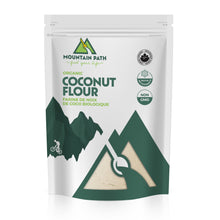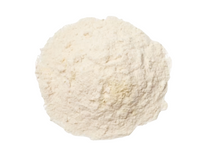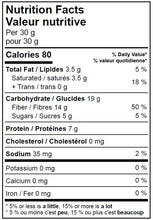Coconut flour is a gluten-free, high-fiber flour made from dried coconut meat. It is a popular alternative to traditional wheat flour, especially among those following gluten-free, paleo, or low-carb diets. Here's a detailed look at coconut flour:
How Coconut Flour is Made:
- Coconut Meat: The process starts with extracting the meat from fresh coconuts.
- Drying: The coconut meat is then dried, typically by dehydrating it, to reduce moisture content.
- Grinding: After drying, the coconut meat is ground into a fine powder, resulting in coconut flour.
Characteristics of Coconut Flour:
- Texture: Coconut flour is very absorbent, meaning it soaks up a lot of liquid when used in recipes. It is typically much drier and more powdery than wheat flour.
- Flavor: It has a mild, slightly sweet coconut flavor, though it is not overpowering.
- Color: Coconut flour is off-white or light cream in color.
Nutritional Benefits of Coconut Flour:
- High in Fiber: Coconut flour is rich in dietary fiber, which promotes digestive health and helps regulate blood sugar levels. It typically contains around 5-6 grams of fiber per 2-tablespoon serving.
- Low in Carbs: Unlike wheat flour, coconut flour is low in carbohydrates, making it suitable for low-carb and ketogenic diets.
- Gluten-Free: Coconut flour is naturally gluten-free, making it a great option for those with celiac disease or gluten sensitivity.
- Rich in Healthy Fats: It contains healthy fats, particularly medium-chain triglycerides (MCTs), which are believed to support brain function and fat metabolism.
- Protein: Coconut flour contains moderate amounts of protein, though it's not as high in protein as some other flours like almond flour or chickpea flour.
Uses of Coconut Flour:
Coconut flour can be used in a variety of ways, often in gluten-free or paleo baking:
- Baking: It can be used to make cakes, muffins, pancakes, and cookies. However, because coconut flour is highly absorbent, you typically need to use more liquid than you would with regular flour. It also often requires additional eggs or binding agents to help provide structure to the baked goods.
- Thickening Agent: Coconut flour can be used to thicken soups, sauces, and gravies.
- Crumb Coating: It can be used as a coating for fried foods, like chicken or vegetables, for a gluten-free alternative to breadcrumbs.
- Smoothies: Some people add a tablespoon of coconut flour to smoothies to boost fiber content.
Tips for Cooking with Coconut Flour:
- Use More Liquid: Because coconut flour is so absorbent, recipes that use coconut flour usually need more liquid (water, milk, or eggs) than those with wheat flour.
- Binders: Coconut flour often requires additional binding agents like eggs, flaxseed, or psyllium husk to hold the mixture together.
- Start Small: If you're substituting coconut flour in a recipe that calls for wheat flour, you can't use a 1:1 ratio. Instead, start with about 1/4 to 1/3 cup of coconut flour for every cup of wheat flour, and then adjust the recipe for consistency.
Storage:
Coconut flour should be stored in an airtight container in a cool, dry place. It can also be kept in the refrigerator or freezer to extend its shelf life, as it can absorb moisture and odors from the air.
Health Considerations:
- Low Glycemic Index: Coconut flour has a low glycemic index, meaning it has a slower effect on blood sugar, making it suitable for people with diabetes or those trying to manage blood sugar levels.
- Allergies: While coconut flour is a great gluten-free option, some people may have sensitivities or allergies to coconut. If you're unsure, always check for possible allergic reactions before using coconut flour in recipes.
In summary, coconut flour is a nutritious, versatile flour with numerous health benefits, especially for those on gluten-free, paleo, or low-carb diets. However, its absorbent nature requires adjustments in recipes, particularly when substituting for traditional flours.






